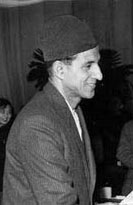B. P. Koirala's ideals and vision: Relevance has not faded - Shanker Man Singh (The Himalayan Times, July 23, 2010)
Today, while commemorating late BP Koirala's anniversary, it will be a great tribute to him if we rededicate our determination to nationalism, democracy and socialism.
It was the Nepalese people and the country that he was concerned about. The legendary leader late B.P. Koirala had, in his statement on December 30, 1976, upon arrival in Nepal after eight years long exile in India, said "Today, our country is in a national crisis. All have realized that this crisis is getting heightened since the last few years. As a result, the very national identity has been endangered…the lack of national unity is a major factor for such a national crisis as a result of which foreign elements have started to become successful to play their dirty games and making Nepal a center of international conspiracy."
B P used to ask: what is nationalism without people? We have suffered and lived through the tricks of those who seem anti- nationals. B.P. Koirala was also an internationalist in his outlook. He was an active member of the Socialist International. He saw the destiny of Nepal in the larger context of the political events happening on the Indian subcontinent and from the perspective of Afro-Asian nationalism on the world stage.
On May 28, 1959, B.P. Koirala, in his first statement on his government's foreign policy, declared that Nepal would not adhere to any military bloc, nor abandon the policy of neutrality in her international relations. It might be noted that his was the only government, in a decade of democratic experiment in Nepal, which did not feel the need to use foreign policy as a means of strengthening its political position. B. P. Koirala's foreign policy was based on mainly pragmatic considerations conducive to Nepal's national interests. He stood for supporting the United Nations because it was regarded as the custodian of the independence, territorial integrity and sovereignty of small nations. He was opposed to power blocks in world politics, since it was thought to pose a constant threat to the real independence of weak nations. He adopted non-alignment because it was viewed as the only policy which could keep Nepal aloof from the whirlwind of the cold war. Lokatantra must stand on the ground of the most common and least privileged of the people composing a country. It must first be of the people before it can be by the people. The emphasis should be not on money; emphasis should be on health, love, creativity, a feeling of communication, destroying all discrimination between the races, between the rich and poor, etc.
The main issue during B.P. Koirala's time was to free Nepal's agrarian society from feudalistic production relations. B.P. very well understood the need to promote private entrepreneurship in business and industry which was in an infant stage. The liberal Industrial Enterprise Act which was brought about by his government is testimony to this fact. BP had always said that the question of distribution in a society which produced very little is only academic, since distribution in such a situation will only mean distribution of poverty. B.P. Koirala had developed the Congress so strong that even after his death the party remained strong with an identity of its own. He was an institution in himself. His new government had a sound political position and a sincere interest in coping with nation's problems. It attempted to streamline the administration of the country, which had stepped into the twentieth century less than 10 years earlier. The Koirala government made efforts to reform land tenure by giving more security to tenants and redistributing part of the larger, still semi-feudal estates.
A cursory review of history indicates that the Nepali Congress, led by B.P. Koirala, laid great emphasis on socialist aims to be realized gradually through democratic means. It gave high priority to the redistribution of land and improvement of agriculture, village development, cottage industry and improvement in health, education and communications. It also favored protection of forest resources, promotion of heavy industry, security of foreign capital and labor legislation. On !5 December, 1960 King Mahendra sounded, without any apparent provocation, the death-knell of parliamentary democracy in Nepal. Royal palace guards arrested B.P. Koirala and all members of the Cabinet. The assembly was dissolved, political parties banned censorship imposed. An emergency was declared and all the provisions of the constitution, including that guaranteeing fundamental rights, were suspended.
Regarding the foreign policy with India B. P.'s viewpoints was clear. The B. P. government sought to define a foreign policy stance that lay somewhere in between, based on a close relationship with India and friendly but rather formal relations with China.
B.P. was a nationalist. But his concept of Nepali nationalism was different from that adopted by fanatical ultra nationalists who claimed a special place for Nepal in the world not on the basis of the bright future but on the glorious past.
Singh is MD, Nepal Stock Exchange
(Source: http://www.thehimalayantimes.com
Back
